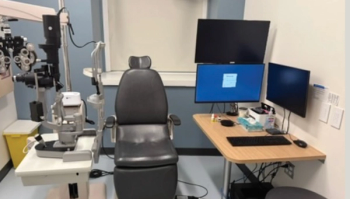
Deep sclerectomy safer than trabeculectomy
Deep sclerectomy is not the holy grail of glaucoma surgery, but available evidence indicates that it is definitively safer than trabeculectomy, according to Tarek M. Shaarawy, MD.
Shaarawy acknowledges that the role of deep sclerectomy in glaucoma surgery is highly controversial and that it has its drawbacks. Those include a long learning curve for the procedure, a longer operative time compared with trabeculectomy and a higher cost if an intrascleral implant is used. However, all publications on this topic seem to agree deep sclerectomy has a safety advantage compared with standard filtration surgery. The procedure is associated with lower rates of hypotony, hyphaema, choroidal detachment and particularly surgically-induced cataract.
A conflict of opinions
Published papers report conflicting data on the efficacy of non-penetrating glaucoma surgery. A number of factors might explain those discrepancies, and among those is variation in techniques used by different investigator groups. Surgeons performed viscocanalostomy or deep sclerectomy, and there is also variability with regard to use of mitomycin-C, an implant and goniopuncture.
"I think everyone would agree that it is not scientifically valid to compare apples and oranges," Shaarawy said.
Operator experience is another source for bias in studies reporting poorer outcomes for non-penetrating glaucoma surgery. That factor is illustrated by the experience of Dietlein and colleagues in Germany who, reporting their outcomes with deep sclerectomy in a series of papers published over several years, initially achieved a 0% success rate that later improved to 40%. Notably, histologic analyses revealed that, in the earliest patients, the dissection depth was too superficial or too deep in more than 70% of cases, which would account for the poor IOP control early on, Shaarawy said.
Defining success
Use of Nd:YAG goniopuncture as a criterion for categorizing eyes as a treatment failure is another factor that may explain poor outcomes of deep sclerectomy and is highlighted by data from Gandolfi et al. who, using that definition, reported a higher success rate in a comparator group of eyes that underwent trabeculectomy. However, if the definition of success was modified to allow inclusion of eyes that had goniopuncture, success rates for the two procedures are similar at all IOP cut-off levels after three years of follow-up, Shaarawy said.
"Eyes treated with Nd:YAG capsulotomy are not considered phacoemulsification failures, so I am not sure Nd:YAG goniopuncture should define deep sclerectomy failure. It is my belief that surgeons should predefine a target IOP for each patient and use goniopuncture whenever the target is not reached," he noted. Shaarawy added that performing goniopuncture does not convert deep sclerectomy into a trabeculectomy. "Even when we change a non-penetrating procedure to a penetrating one by performing the goniopuncture, deep sclerectomy still has lower complication rates and it is likely that it accesses uveoscleral outflow that is not achieved with trabeculectomy," he said.
The results speak for themselves
The potential for deep sclerectomy to result in good outcomes is demonstrated by the long-term results from Shaarawy's series of 105 eyes of 105 patients, which were followed for up to eight years. Mean IOP decreased from 26.8 ± 7.7 mmHg preoperatively to around 5 mmHg on the first postoperative day, and was 12 ± 3 mmHg at month 78, he reported.
Newsletter
Get the essential updates shaping the future of pharma manufacturing and compliance—subscribe today to Pharmaceutical Technology and never miss a breakthrough.




























